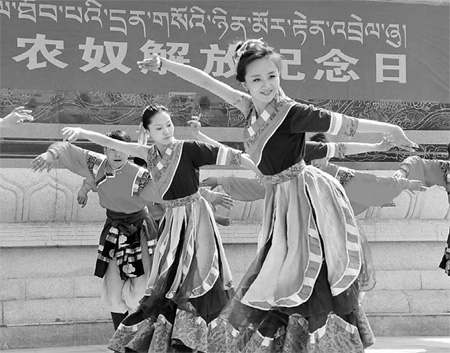Op-Ed Contributors
From dark past to bright future
Updated: 2011-07-12 07:11
(China Daily)
3. The liberation of Tibet was an important part of the Chinese people's cause of liberation.
In face of aggression and oppression from imperialists, all ethnic groups of China, including the Tibetans, waged unyielding struggles for more than a century, at the cost of many lives, in order to safeguard the independence, unity and territorial integrity of China, and to realize the liberation of the Chinese nation. It was under the leadership of the CPC that the Chinese people achieved final victory in the Liberation War after extremely hard struggle. In 1949 the Chinese people won a decisive victory in the people's Liberation War, and the People's Republic of China was founded. Then, it came on the agenda that the PLA would march into Tibet, liberate it and expel imperialists from it.
In response to "Tibetan independence" activities plotted by imperialists and reactionary forces from the upper strata of Tibet, on Sept 2, 1949 Xinhua News Agency, with authorization from the CPC, published an editorial under the headline, "Foreign Aggressors Are Resolutely Not Allowed to Annex China's Territory - Tibet." The editorial summarized how some big powers had invaded Tibet over the previous century, and then pointed out, "Tibet is part of Chinese territory; all foreign aggression is not allowed. The Tibetan people are an inseparable part of the Chinese nation, and any attempt to divide them from China will be doomed. This is a consistent policy of the Communist Party of China and the People's Liberation Army."
All sectors of society in Tibet quickly responded and expressed support for the editorial and expressed the hope that the PLA would enter Tibet as soon as possible. On Oct 1, 1949 the 10th Panchen Lama sent a telegram to the Central People's Government: "Dispatch troops to liberate Tibet and expel the imperialists as soon as possible." On Nov 23 Mao Zedong and Zhu De telegraphed the 10th Panchen Lama: "The Central People's Government and the Chinese People's Liberation Army will certainly comply with this wish of the Tibetan people."
On Dec 2 Reting Yeshe Tsultrim, an aide of the 5th Regent Reting Rinpoche, arrived in Xining, Qinghai province, to complain to the PLA about imperialist atrocities destroying the internal unity of Tibet, urging the PLA to liberate Tibet as soon as possible.
In early 1950 over 100 Tibetan people, including farmers and herdsmen, young people, women and democratic representatives, assembled in Lanzhou, which had been liberated not long before, and urged the PLA to liberate Tibet. The 5th Gedar Tulku of Beri Monastery in Garze, Xikang (Kham) province, headman Shaka Tobden of Yilung in northern Xikang, and the business tycoon Pangda Dorje in southern Xikang sent representatives to Beijing to pay tribute to Chairman Mao Zedong of the Central People's Government and expressed the Tibetan people's urgent and earnest wish for the liberation of Tibet.
To address the complicated changes in the international situation and the grave situation in Tibet, and to satisfy the Tibetan people's wish for liberation as soon as possible, in December 1949 Mao Zedong wrote a letter to the CPC Central Committee in Manzhouli on his way to the Soviet Union for a visit. In the letter, Mao made the strategic decision that "it is better for the PLA to enter Tibet sooner rather than later".
When planning the liberation of Tibet and exploring the way of liberation, the CPC decided on the way of peaceful liberation in view of the fact that Tibet was a special region inhabited by the ethnic minorities, in order to enable the PLA to enter Tibet smoothly, safeguard the interests of the Tibetan people and strengthen national unity. In March 1949 when the people's Liberation War was about to end with people's victory, Chairman Mao pointed out that the possibilities of peaceful liberation, like that of Beiping, for other areas were growing. Then Hunan and Ningxia, as well as Xinjiang, Yunnan and Xikang, which all bordered Tibet, were liberated peacefully in succession, affording useful experience for the peaceful liberation of Tibet.
On Jan 20, 1950, in response to the local government of Tibet's dispatching of a so-called "goodwill mission," a spokesperson of the Ministry of Foreign Affairs delivered a speech with authorization from Chairman Mao, saying that the Tibetan people demanded the exercise of appropriate regional autonomy under the unified leadership of the Central People's Government, and that "if the Lhasa authorities send delegates to Beijing to negotiate the peaceful liberation of Tibet, they will be well received."
To achieve the peaceful liberation of Tibet, the Central People's Government organized and did a lot of work in political persuasion. In 1950 the Southwest and Northwest bureaux of the CPC Central Committee sent delegates or delegations to Tibet for mediation four times, in order to persuade the 14th Dalai Lama and the local government of Tibet to send representatives to negotiate with the Central People's Government on the peaceful liberation of Tibet. On Feb1 the Northwest Bureau sent a Tibetan cadre, Zhang Jingcheng, to Tibet with a letter for the 14th Dalai Lama and Regent Taktra Ngawang Sungrab from Liao Hansheng, then vice-chairman of the Qinghai Provincial People's Government. At the end of March an eminent Han monk, Master Zhiqing, who had good relations with the political and religious circles of Tibet, started for Tibet from Chengdu, with approval from the CPC Central Committee and the support of the Southwest Bureau. In July a delegation composed of members from Qinghai temples and monasteries, led by Taktser Rinpoche of Kumbum Monastery, set out from Xining. Sherab Gyatso, vice -chairman of the Qinghai Provincial People's Government and a leading Tibetan scholar, delivered a radio talk, calling on the local government of Tibet to "quickly dispatch plenipotentiary representatives to Beijing for peace talks." On July 10 a delegation of 10, including the 5th Gedar Tulku of Beri Monastery in Garze, Xikang, also went to Tibet. However, these mediation activities suffered obstruction from imperialist aggressors and pro-imperialist separatists in Tibet. They were driven away or detained, some delegations were split up, and Gedar Tulku was even poisoned to death in Qamdo.
Meanwhile, the local government of Tibet, incited by imperialist aggressors and dominated by the pro-imperialist separatists in the upper strata of Tibet, expanded the Tibetan army and deployed seven regiments in areas around Qamdo along the western bank of the Jinsha River, in an attempt to halt the PLA's advance into Tibet. Qamdo was the only way into Tibet from the southwest. On Aug 23, 1950 Mao Zedong pointed out that the capture of Qamdo "will help us to change the political situation in Tibet and advance into Tibet next year", and "may spur the Tibetan delegation to come to Beijing for negotiations for a peaceful settlement". On Oct 6 the PLA troops started to cross the Jinsha River to carry out the task of liberating Qamdo. On Oct 19 Qamdo was liberated. On this basis, the First People's Congress of Qamdo was held, at which the Qamdo People's Liberation Committee was elected and a working committee was founded, composing of representatives from both the ecclesiastical and secular, in Qamdo to strive for the peaceful liberation of Tibet. The Qamdo Battle opened the door to peace negotiations and created the necessary conditions for the peaceful liberation of Tibet.
|
Tibetan people celebrate Serfs Emancipation Day at a park in Lhasa on March 28, 2011. Zhao Guanshen / for China Daily |

Specials

90th anniversary of the CPC
The Party has been leading the country and people to prosperity.

The write stuff
'Pen capital' goes back to drawing board for answers to economic changes taking shape in Zhejiang

Say hello to hi panda
An unusual panda is the rising star in Europe's fashion circles
